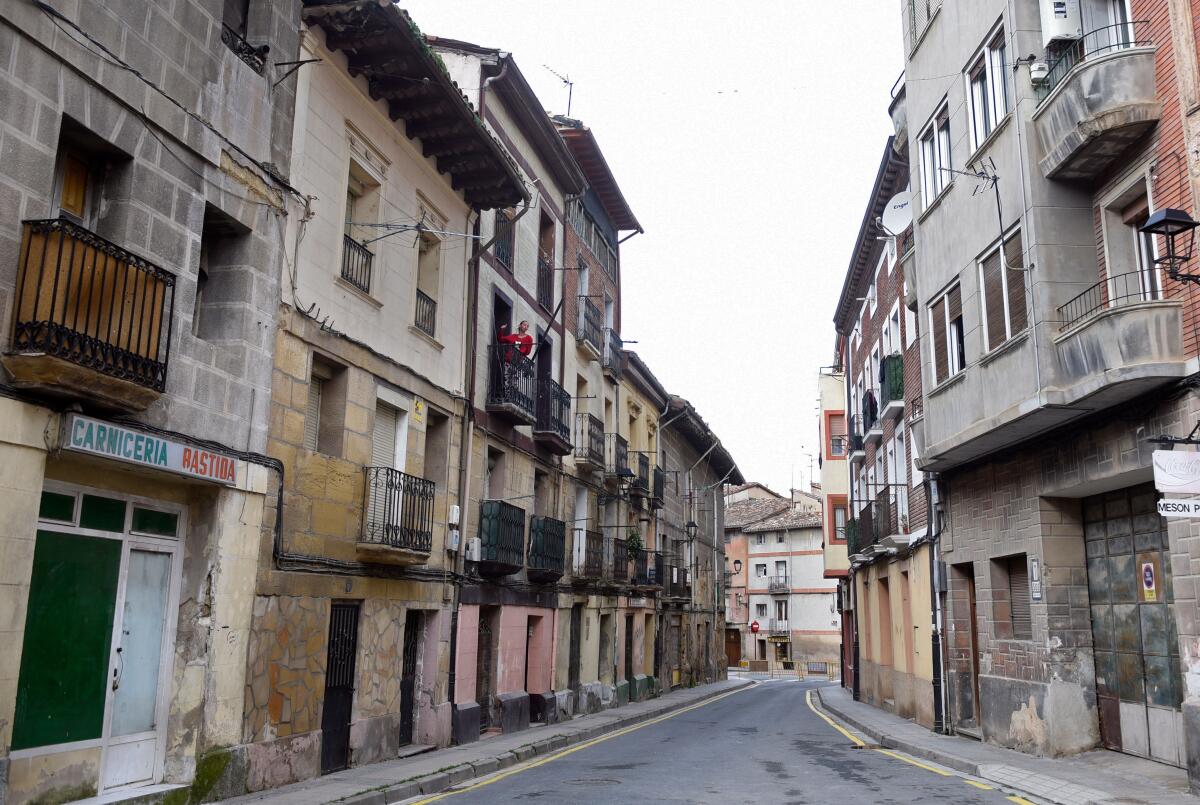In this wine-making town in Spain, the disinformation was almost as bad as the coronavirus itself

- Share via
HARO, Spain — As in many communities worldwide, a coronavirus outbreak has hit Haro, a town of 12,000 that is the de facto capital of La Rioja, Spain’s prized wine region.
But the town — famed for its production of Tempranillo and for an annual Wine Battle festival in which participants spray, pour and toss red wine at one another — has come under another plague: misinformation.
Last weekend, many news outlets circulated inaccurate reports that the streets had been blockaded, neighborhoods quarantined and the town placed under a lockdown similar to the one imposed in Italy. One widely circulated image showed a street that had been blocked off — but in reality that street had been closed for construction. Residents — and eventually the region’s health ministry — tried to fight back with facts, but it has been a frustrating battle.
“It’s a problem of disinformation,” said bar owner Michel Redondo, 54. “You can enter and leave the town without a problem. But the information that’s being given is that we are here, locked up.”
As of Thursday, the region of La Rioja counted 220 COVID-19 cases, many of which can be traced to a handful of residents in Haro, according to the regional health ministry. Two people in the region have died of the disease, out of a total of 84 deaths across Spain as of Thursday evening.
It is believed that the Haro residents contracted the virus about a week ago at a funeral in Vitoria, the capital of the neighboring Basque Country, and returned to town without noticing symptoms.
After the first of these residents went to the hospital with fever-like symptoms, other cases cropped up around the town. Officials asked infected residents to self-quarantine for two weeks.
When some infected residents broke the quarantine and left their homes, police took more drastic measures. Wearing hazmat suits, officers hand-delivered notices to the residents: Comply, or risk a fine of up to $670,000.
From these scenes came the viral photos, including images of the police in hazmat suits and of a blockaded street. (The street, in fact, had been blocked off for prior construction work.) And in a news conference Saturday, Fernando Simón, the doctor in charge of coordinating Spain’s coronavirus response, mentioned the possibility of quarantining entire neighborhoods in the town.
In reality, the town is quiet — not because of mass quarantines, but because tourists have stopped coming.
Haro, a sleepy village surrounded by vineyards, lives off tourism. The town boasts more than 15 wineries, many of which are a century old. During the summer, Haro’s population doubles.
For its business owners, more alarming than the virus is the threat the bad news poses to the local economy — just as warm weather sets in and the tourist season begins.
In mid-March, the scenes in Haro are these: empty bars, shuttered restaurants, bored receptionists.
Winemakers have canceled vineyard tours. Restaurants have closed down, posting notices on their windows referring to a “week’s break.”
On Tuesday evening, Miguel Achotegui sat on the breezy terrace of his hotel, lamenting the drop-off in guests. Only three of his 21 rooms were occupied — and two of them were taken by Haro residents whose homes were being remodeled.
Achotegui had spent the previous day fielding phone calls from worried tourists. It’s fine, he told them.
They canceled anyway.
“This time of year, this place is usually full. Especially on Saturdays,” Achotegui said, swirling a glass of Tempranillo on a wooden table. “Next Saturday, I don’t have a single reservation.”
Achotegui had run the hotel for a decade. Never before had he seen an empty Saturday.
The receptionist’s desk is littered with crossed-out reservation slips. At lunchtime, the dining room saw one customer — for takeaway.
Achotegui and others in the hospitality industry worry about the year’s most important event, Semana Santa, just a month away. What if that gets canceled?
If the virus had broken out in November, Achotegui said, there would have been little economic repercussion. But now, with the tourists season just beginning, the next several weeks look bleak.
“We’re here with our tongues out.”
Redondo, the bar owner, said drivers have called him to ask if they’ll be able to enter town to deliver products.
While business owners and local politicians are eager to promote the image of a tranquil town whose residents continue with their normal lives, officials have taken advanced measures to control the spread of the virus. On Tuesday, the region’s health ministry shut down all schools for 15 days. They have also encouraged people to work from home when possible.
Sporting events have been canceled, as were activities to celebrate International Women’s Day on Sunday.
Redondo acknowledges there is a social panic spreading through town. “I’ve noticed fewer people on the streets,” he said.
Televised coronavirus updates are the background noise in most restaurants. Conversations about the virus carry across plazas. People have become awkward in their greetings, uncertain about giving the standard two kisses on the cheeks and sometimes opting for a half wave, or an elbow nudge.
In one bar, a man pondered buying a mask.
“Why?” asked the bartender.
The man looked at his hands. “I’m old,” he said.
Joseba Martín Díez, the man behind the town’s news outlet, Haro Digital, has worked long hours in the last several weeks, single-handedly authoring more than 50 articles about COVID-19. While he’d like to work on combating misinformation about the city, he’s too busy chasing down health officials and new cases.
“I have no time,” he said.
Fortunately, Achotegui said that news outlets have recognized their early lapses in coverage and are making an effort to correct previous stories. The other day, he went on the Spanish television channel La Sexta to make the case for visiting Haro.
But he feared it was too late.
“It’s already done,” he said.
Bernhard is a special correspondent.
More to Read
Sign up for Essential California
The most important California stories and recommendations in your inbox every morning.
You may occasionally receive promotional content from the Los Angeles Times.










